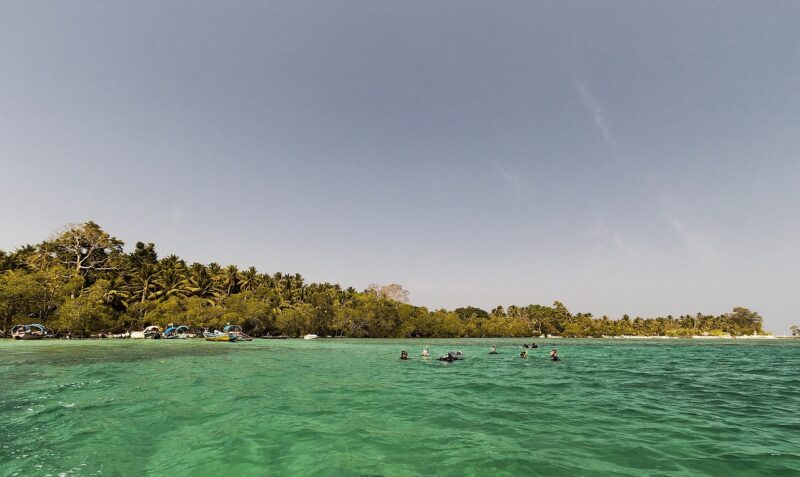The Andaman and Nicobar Islands, located in the Bay of Bengal, are a paradise on earth with their pristine beaches, lush forests, and vibrant marine life. However, the growing tourism industry in the islands has raised concerns about its impact on the fragile ecosystem and the local communities. To address these concerns, the Andaman and Nicobar Islands have implemented sustainable tourism practices that promote responsible tourism and preserve the natural and cultural resources of the islands.
Environmental Conservation Efforts: The Andaman and Nicobar Islands have implemented several measures to protect their fragile ecosystem from the negative impacts of tourism. For instance, the islands have established marine protected areas to conserve the rich marine biodiversity. These protected areas include the Mahatma Gandhi Marine National Park, which is home to over 50 species of corals, and the North Button Island National Park, which is the only park in India that protects the dugong, a vulnerable marine mammal.
Additionally, the islands have banned activities such as coral mining, hunting, and fishing in certain areas to prevent damage to the ecosystem. The islands also promote eco-tourism activities such as snorkeling and scuba diving, which not only provide visitors with an opportunity to experience the rich marine life but also promote conservation efforts by raising awareness about the need to protect the marine ecosystem.
Community-Based Tourism: The Andaman and Nicobar Islands promote community-based tourism, which provides economic benefits to local communities while preserving their culture and traditions. The islands have several homestays, where visitors can stay with local families and experience their way of life. The islands also offer village tours, where visitors can learn about the local communities’ customs, traditions, and handicrafts.
The islands have also established a sustainable tourism development society that works with local communities to develop sustainable tourism practices. The society helps to promote community-based tourism, support local businesses, and provide training and employment opportunities to local people.
Preservation of Culture and Heritage: The Andaman and Nicobar Islands have a rich cultural and historical heritage that is closely tied to their natural environment. The islands have implemented several measures to preserve their cultural and historical heritage, such as the Cellular Jail National Memorial, which is a reminder of India’s struggle for independence.
The islands also promote cultural tourism by organizing festivals and events that showcase the local communities’ music, dance, and food. These events not only provide visitors with an opportunity to experience the islands’ culture but also provide economic benefits to local communities.
Government Initiatives: The Andaman and Nicobar Islands’ government has taken several initiatives to promote sustainable tourism practices. The government has established a tourism department that works to develop sustainable tourism policies and initiatives. The department works closely with local communities, conservation organizations, and tourism operators to promote responsible tourism practices.
The government has also launched several campaigns to promote sustainable tourism practices, such as the “Green and Clean Islands” campaign, which aims to promote eco-friendly tourism practices and raise awareness about environmental conservation. The government has also implemented waste management initiatives to reduce the amount of waste generated by tourism activities.
Impact of Sustainable Tourism: Sustainable tourism has had a positive impact on the Andaman and Nicobar Islands by providing economic benefits to local communities, preserving the natural and cultural resources of the islands, and promoting conservation efforts. Sustainable tourism practices have also helped to raise awareness about the need to protect the islands’ fragile ecosystem and have encouraged visitors to become responsible tourists.
Similar Articles
20 Sustainable Tourism Practices and Destinations in India to Visit Now
Sustainable Tourism Practices and Destinations: Examples from Around the World
Frequently Asked Questions
What is sustainable tourism?
Sustainable tourism is tourism that promotes responsible tourism practices, preserves natural and cultural resources, and provides economic benefits to local communities.
How does sustainable tourism benefit the Andaman and Nicobar Islands?
Sustainable tourism benefits the Andaman and Nicobar Islands by providing economic benefits to local communities, promoting conservation efforts, and preserving the islands’ natural and cultural resources.
What is community-based tourism?
Community-based tourism is a form of tourism that promotes local communities’ involvement and benefits them economically, socially, and culturally.
What are some examples of community-based tourism in the Andaman and Nicobar Islands?
Some examples of community-based tourism in the Andaman and Nicobar Islands include homestays, village tours, and cultural events.
How does the government of the Andaman and Nicobar Islands promote sustainable tourism?
The government of the Andaman and Nicobar Islands promotes sustainable tourism by establishing a tourism department that works to develop sustainable tourism policies and initiatives, launching campaigns to promote eco-friendly tourism practices, and implementing waste management initiatives.
What is the impact of sustainable tourism on the Andaman and Nicobar Islands?
Sustainable tourism has had a positive impact on the Andaman and Nicobar Islands by providing economic benefits to local communities, preserving the natural and cultural resources of the islands, and promoting conservation efforts. Sustainable tourism practices have also helped to raise awareness about the need to protect the islands’ fragile ecosystem and have encouraged visitors to become responsible tourists.
How can tourists contribute to sustainable tourism in the Andaman and Nicobar Islands?
Tourists can contribute to sustainable tourism in the Andaman and Nicobar Islands by practicing responsible tourism practices, such as minimizing waste, respecting local customs and traditions, and supporting local businesses. They can also participate in eco-tourism activities and opt for community-based tourism options such as homestays and village tours.
What are some eco-tourism activities in the Andaman and Nicobar Islands?
Some eco-tourism activities in the Andaman and Nicobar Islands include snorkeling, scuba diving, trekking, and birdwatching. These activities not only provide visitors with an opportunity to experience the islands’ natural beauty but also promote conservation efforts by raising awareness about the need to protect the islands’ fragile ecosystem.
How can the Andaman and Nicobar Islands continue to promote sustainable tourism in the long term?
The Andaman and Nicobar Islands can continue to promote sustainable tourism in the long term by working closely with local communities, conservation organizations, and tourism operators to develop and implement sustainable tourism policies and initiatives. They can also continue to raise awareness about the importance of conservation and responsible tourism practices and invest in initiatives that promote economic benefits to local communities while preserving the islands’ natural and cultural resources.
What are some challenges facing sustainable tourism in the Andaman and Nicobar Islands?
Some challenges facing sustainable tourism in the Andaman and Nicobar Islands include managing waste and preserving the fragile ecosystem, balancing economic development with conservation efforts, and addressing the negative impacts of mass tourism.
How can waste management be improved in the Andaman and Nicobar Islands?
Waste management in the Andaman and Nicobar Islands can be improved by implementing policies and initiatives that encourage responsible tourism practices, such as minimizing waste and promoting recycling. This can be achieved through public education campaigns, waste segregation and recycling programs, and responsible waste disposal practices.
What role do local communities play in sustainable tourism in the Andaman and Nicobar Islands?
Local communities play a vital role in sustainable tourism in the Andaman. They are often the stewards of the islands’ natural and cultural resources and can benefit economically from sustainable tourism initiatives. By involving local communities in tourism planning and development, sustainable tourism can provide economic and social benefits to communities while preserving the islands’ natural and cultural resources.
What are some responsible tourism practices that tourists should follow in the Andaman and Nicobar Islands?
Some responsible tourism practices that tourists should follow in the Andaman and Nicobar Islands include respecting local customs and traditions, minimizing waste, supporting local businesses, and participating in eco-tourism activities. They should also avoid activities that harm the islands’ natural and cultural resources, such as littering, damaging coral reefs, or disrupting wildlife.
What is the role of eco-tourism in sustainable tourism in the Andaman and Nicobar Islands?
Eco-tourism plays a significant role in sustainable tourism in the Andaman by providing visitors with an opportunity to experience the islands’ natural beauty and promoting conservation efforts. Eco-tourism activities such as snorkeling, scuba diving, and trekking can also raise awareness about the need to protect the islands’ fragile ecosystem and encourage responsible tourism practices.
How can sustainable tourism contribute to the conservation of the Andaman and Nicobar Islands’ unique biodiversity?
Sustainable tourism can contribute to the conservation of the Andaman’s unique biodiversity by raising awareness about the need to protect the islands’ fragile ecosystem, promoting conservation efforts through eco-tourism activities, and supporting local conservation organizations. By encouraging responsible tourism practices and investing in initiatives that promote the islands’ conservation, sustainable tourism can help to protect the islands’ unique biodiversity for future generations.










